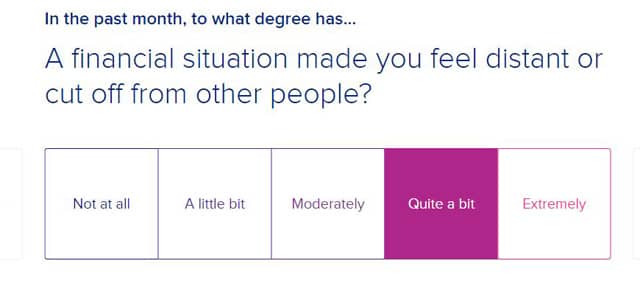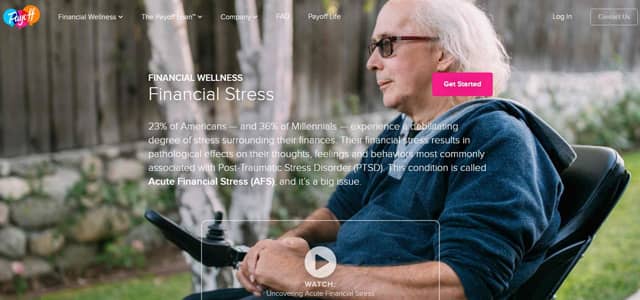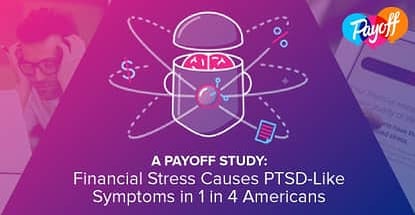In a Nutshell: Payoff, a lender that blends psychology with finances, recently released a groundbreaking study that found a link between financial stress and Post-Traumatic Stress Disorder. A team of PhDs discovered that the symptoms of PTSD were indistinguishable from the symptoms of financial stress. Dr. Galen Buckwalter, Payoff’s Chief Science Officer, has dubbed this condition Acute Financial Stress (AFS). To identify and treat those with AFS, Payoff developed a six-question Financial Stress Test as well as a series of therapeutic emails coaching mindfulness and empowerment. //
Stress happens. As you go through your day, you inevitably come across conflict, difficulty, frustration, and it’s only natural to worry over it. Maybe you scream into a pillow. Maybe you eat an entire bag of potato chips in one sitting. People have their own way of coping and moving on from distressing situations.
The danger comes when your stress takes over your life, warping your perceptions, distancing you from fulfilling relationships, giving you nightmares, and impeding your ability to enjoy life.
That’s when stress becomes a serious mental health issue. A recent study has linked the stress that Americans feel about making ends meet to the stress felt by veterans coming back from combat.
It may seem hyperbolic to say that your wallet is like a war zone, but, in terms of the psychological effects, Payoff scientists believe it’s not so different.
Payoff is a lender that blends psychology with finances to issue loans and help customers understand how to use credit cards, pay down debt, and relieve financial stress. This BadCredit.org article details the revolutionary work being done by Payoff’s Empowerment Science team.

Dr. Galen Buckwalter, Chief Science Officer at Payoff, has authored over 150 peer-reviewed articles.
Taking a human approach to the financial sector, Payoff employs a team of scientists to gain insight into how people’s personalities, emotions, and behaviors impact their bank accounts. Heading up the research efforts of the Empowerment Science team is Galen Buckwalter, the Chief Science Officer at Payoff. Galen has a PhD in psychology and over 150 peer-reviewed articles to his name.
In a survey of 2,011 American adults, the Empowerment Science team discovered that, for some people, worry over paying bills can be as debilitating as Post-Traumatic Stress Disorder. Payoff researchers call this condition Acute Financial Stress. Those with AFS experience nightmares, hypervigilance, avoidance, and other intense psychological symptoms.
Financial stress has reached such a level that it is negatively impacting the thoughts, feelings, and behaviors of many people in the United States. Payoff’s research indicates that 23.2% of Americans, including 35.3% of Millennials (ages 22 to 29), suffer from AFS.
“Our findings suggest that there’s potentially millions of Americans that are in very significant stress-related dysfunction,” Galen says. “That’s the issue, and we can’t ignore that.”
Fear: The Outlier In Payoff’s Study of Financial Personality
When examining financial behavior from a psychological perspective, the Empowerment Science team expected behaviors to line up according to the five primary personality dimensions: openness, conscientiousness, extraversion, agreeableness, and neuroticism.
“Those five dimensions are amazingly robust across any culture, age group, gender, ethnicities — those five dimensions will always kind of emerge. Except we kept seeing this other factor emerge,” Galen explains, “and the only commonality between them was fear.”
This factor wasn’t expected, but it was significant.
A deep-seated fear over not making ends meet, failing to pay off debts, becoming homeless, all had a marked effect on the brain. Galen describes how this dysfunction often exacerbated financial problems by promoting harmful behaviors based on denial, avoidance, or irrationality.
“People were consistently late with payments,” he says. “They isolated themselves. They didn’t talk to family members or anyone about the financial situation. There was avoidance and just all these fear-based behaviors.”
Payoff’s Chief Science Officer was familiar with the symptoms his team was seeing. Prior to joining the financial lender, he worked at the Institute for Creative Technology, a think tank funded by the Department of Defense to blend academia with advanced technology. Galen’s main project was to teach soldiers to be resilient in the face of combat. He did so by using virtual reality technology that provided context for what the soldiers would be doing and seeing.
Pulling from his experience with veterans, Payoff’s Chief Science Officer made a connection between PTSD and financial stress.
“There’s obvious differences in the cause: traditional PTSD as defined by a psychiatrist would require an identifiable life-threatening trauma,” he says. “We weren’t seeing that, but the symptoms of hopelessness, denial, avoidance, hypervigilance, the nightmares, inability to sleep — all of those symptoms were there.”
The Empowerment Science team delved deeper to test out the theory that financial stress causes symptoms similar to PTSD. A survey went point by point through the PTSD Checklist, adapting the questions to ascertain if people felt extreme symptoms like hypervigilance and difficulty sleeping because of their finances.
The answer was a resounding yes. In a non-representative survey on a crowdsourcing site, the results revealed that 40% of respondents fit the criteria for PTSD-related financial stress. This validated the team’s hypothesis and led to a study with a more representative sample of 2,011 Americans.

Backed by psychological research, Payoff’s Financial Stress Test applies PTSD symptoms to financial stresses.
Again, the results indicate a significant correspondence. Payoff estimates that nearly 1 in 4 Americans experience Acute Financial Stress, characterized by PTSD-like symptoms.
“We have a board-certified clinical psychologist that’s part of our team,” Galen says. “Dr. Ryan Howes has worked with lots of people with AFS as well as lots of people with PTSD, and he sees no difference in how it actually impacts people’s lives.”
The Empowerment Science team continues to be struck by the powerful impact that financial worry can have on a person’s thoughts, emotions, and behaviors. It’s a pervasive problem that’s largely overlooked in both the financial and psychological sector.
“We really don’t want to underestimate the severity of what these people are experiencing,” Payoff’s Chief Science Officer says. “It continues to be quite a profound find for us.”
Who’s At Risk: By Age, Income, and Personality
Payoff’s findings have only just been announced, but they already have struck a chord with many individuals. Galen has heard dozens of stories from all quadrants about people who identify with the symptoms of Acute Financial Stress. He says the overall feedback has been that people resonate with the findings of the study.
That in itself is a victory.
“Part of PTSD is the fact that it isolates people,” the Chief Science Officer explains. “It’s hard for people with this profile of symptoms to express themselves to others and talk about what they’re experiencing. We’re hoping that, just by getting the word out, it’s going to be the first step for a lot of other people. They are going to realize that they’re not alone.”

AFS is characterized by symptoms such as irritability, guilt, difficulty concentrating, hypervigilance, avoidance, and emotional numbing.
Quality of life relates to so much more than just your bank account, yet some people cannot seem to escape money concerns. People of certain ages, incomes, and personalities show elevated levels of AFS compared to average Americans.
You can test yourself to see if you’re experiencing signs of AFS by taking Payoff’s online Financial Stress Test.
With 1 in 3 Diagnosed, Young People See a Higher Rate of AFS Than Average
Millennials, born between 1981 and 1997, represent a significant chunk of the U.S. population. Payoff’s study found that 35.3% of this young generation feels PTSD-related symptoms regarding their personal finances. This is above the average for that study.
According to these findings, young people are experiencing more negative side effects due to financial strain. This could be because Millennials are just starting to establish themselves financially, possibly while burdened by student debt. It could be a generational difference in how people view money.
Whatever the cause, what’s clear from Payoff’s research is that Millennials have a higher risk for financially-induced stress.
Once Above the Poverty Line, Income Level Not a Factor for Having AFS
Unsurprisingly, those living below the poverty line were more susceptible to Acute Financial Stress. High amounts of debt and low levels of income naturally lead to above-average stress.
“The rates of AFS were through the sky among people that weren’t making enough money to survive,” Galen notes. “But you get above the poverty level, and there really was no difference whether you were making $50,000 or whether you were making $200,000 — in terms of how prone you are to this condition.”
AFS isn’t necessarily rooted in reality, but rather by a psychological pressure that people feel to spend money as a way to achieve happiness. Galen finds this rationale problematic for a balanced life. He describes his own childhood as one with little financial means but much heartfelt contentment.
“We were farmers, you know. We never had more than enough to take care of our basic needs, but we were happy as happiness could be,” he recalls. “It was a richly rewarding life. That’s what we need to be thinking about: how do we find that sense of meaning and purpose no matter where we happen to be at on the financial index.”
Emotional Personalities Are More Susceptible to AFS
Your personality type impacts how you react and view your finances. There’s much variation from individual to individual.
“Part of personality is how emotional we are, how impulsive we are,” Galen says. “We found that, in terms of personality, the most susceptible to Acute Financial Stress are people who are highly emotional.”
However, it’s not all bad news for highly emotional individuals, because that very weakness is also a strength helping them to better understand and control their emotions. Galen says that, in general, more emotionally aware people respond better and faster to treatment.
“Once you know your personality and start to integrate that into your financial life and how you deal with your emotions,” he says, “that information about your personality can actually end up being your best ally in working through this kind of thing.”
While some personalities are considered high-risk for Acute Financial Stress, others are relatively low-risk. The Chief Science Officer points to the financial personality called “The Rock” as being especially resistant to the symptoms of AFS. This personality type is noted for above average calmness, and so has a higher threshold of tolerance for stress.
Payoff Helps Treat AFS Through Therapy Emails
Payoff was not satisfied merely identifying the chronic issue, but immediately set out to treat it. Dr. Howes, Payoff’s resident Clinical Psychologist, was instrumental in developing a therapy program to help relieve financial stress. Payoff Peace offers emotional and psychological coaching, delivered right to your inbox.
“We’re currently offering a series of cognitive behavior therapy exercises at Payoff that people can access free of charge,” Galen says. “We send out emails with these exercises, and we’re seeing a pretty amazing completion rate.”
Anyone can submit their email address to subscribe to the Payoff Peace Email Series. This six-part series strives to provide clear instructions and techniques that will empower individuals to break old patterns of thinking and form healthier habits.
It takes no more than 10 minutes to get through an exercise, sent every few days. These emails rely on simple audio recordings or worksheets. For example, recipients are directed to “Name it to Tame it” by journaling regularly about their stress. Payoff also gives step-by-step instructions for progressive muscle relaxation and negative thought replacement.
“It’s a very thoughtful and systematic approach,” Galen explains, “to try to help people bring down the intensity of the symptoms.”

Dr. Galen Buckwalter recommends mindfulness as a way of “clearing out your emotional palate and not having your mind racing around.”
While cognitive therapy won’t rid you of the root cause of the stress, it does help with the emotional fallout. Financial stress doesn’t need to be crippling, especially with the Empowerment Science team talking you through it.
Payoff’s supportive email series aims to put you in a clearer state of mind, giving you the ability to confront your financial worries and start improving your behaviors simply by being aware and mindful.
Proposing a journey toward self-understanding, Galen encourages people to take up mindfulness training, which he describes as meditation-lite. “I’m a huge fan of mindfulness,” he says. “It’s really a profound way of just changing your brain, literally. All you do is take a minute or two — particularly during times when you’re most stressed out — and just clear your mind.”
Taking that moment to center yourself is important to regain perspective and stay calm even in the face of conflict, loss, or turmoil.
“It’s not a matter of denying emotions that you’re feeling,” he says. “It’s more a matter of just accepting them and getting through that cognitive process and accepting where you’re at emotionally.”
Payoff Works Toward Better Understanding Financial Health
At this moment, millions of Americans could be feeling stress that goes way beyond normal, healthy levels. Acute Financial Stress is a condition that weakens a person’s overall ability to think and behave — and cannot always be dealt with alone.
That’s the mission of the Empowerment Science team: to help others on the journey toward a healthy mind and balanced pocketbook. Conducting research in the field with its own members, the Payoff team is still learning, still striving to understand how finances impact a person’s state of mind.
Galen lights up when he talks about his team’s goals and the company’s future. “We need to be thinking about ways that we can identify these folks with AFS,” he says, “how we can get treatment to help to them, and how we can get them on a path to true financial wellness.”
Advertiser Disclosure
CardRates.com is a free online resource that offers valuable content and comparison services to users. To keep this resource 100% free, we receive compensation for referrals for many of the offers listed on the site. Along with key review factors, this compensation may impact how and where products appear across CardRates.com (including, for example, the order in which they appear). CardRates.com does not include the entire universe of available offers. Editorial opinions expressed on the site are strictly our own and are not provided, endorsed, or approved by advertisers.


![5 Personal Loans For Credit Card Debt Payoff ([updated_month_year]) 5 Personal Loans For Credit Card Debt Payoff ([updated_month_year])](https://www.cardrates.com/images/uploads/2022/09/Personal-Loans-For-Credit-Card-Debt-1.jpg?width=158&height=120&fit=crop)
![9 Best Study Abroad Credit Cards for Students ([updated_month_year]) 9 Best Study Abroad Credit Cards for Students ([updated_month_year])](https://www.cardrates.com/images/uploads/2018/06/Best-Study-Abroad-Credit-Cards.jpg?width=158&height=120&fit=crop)





